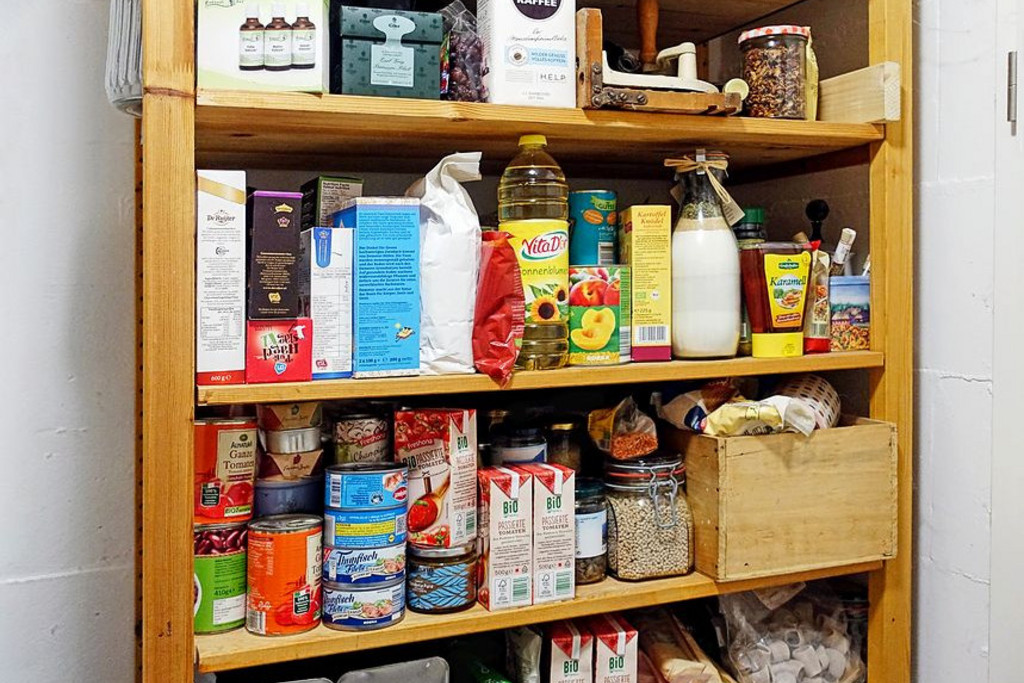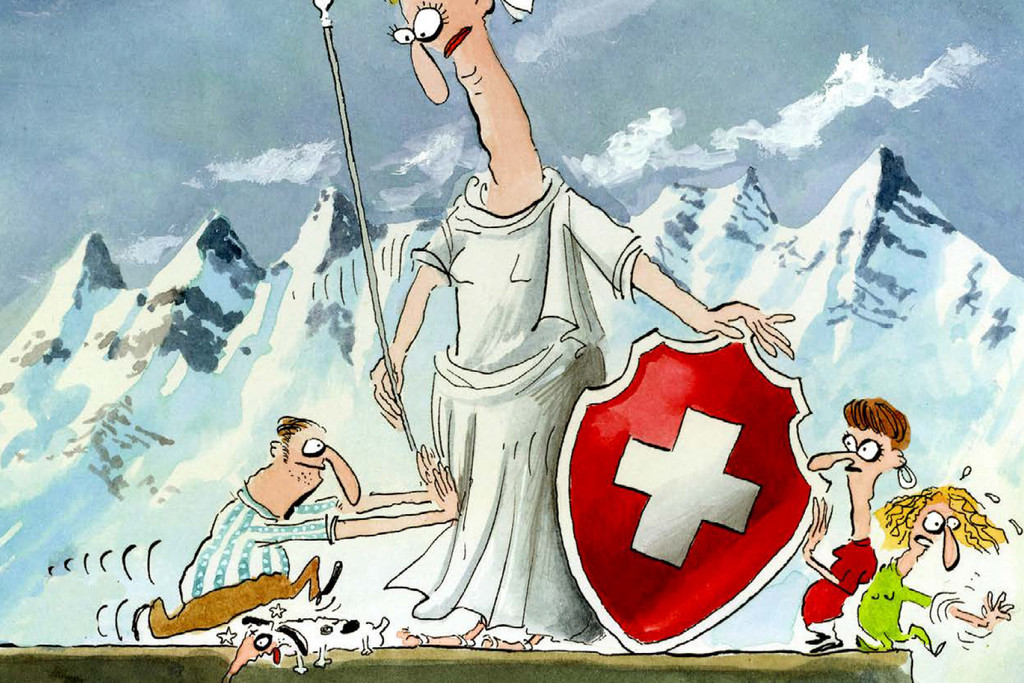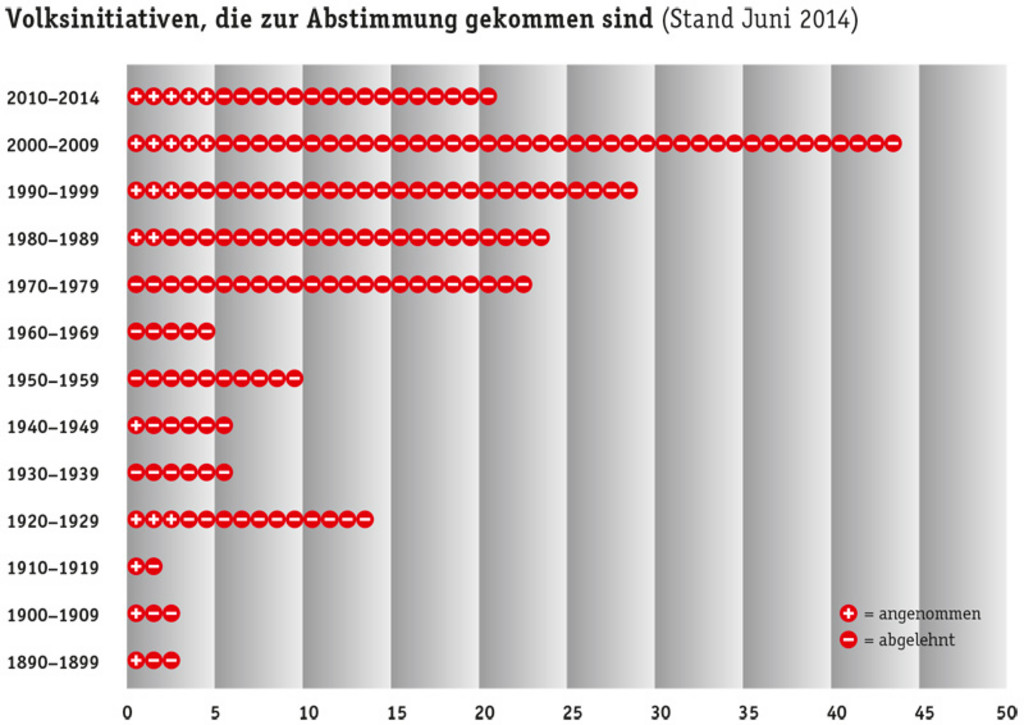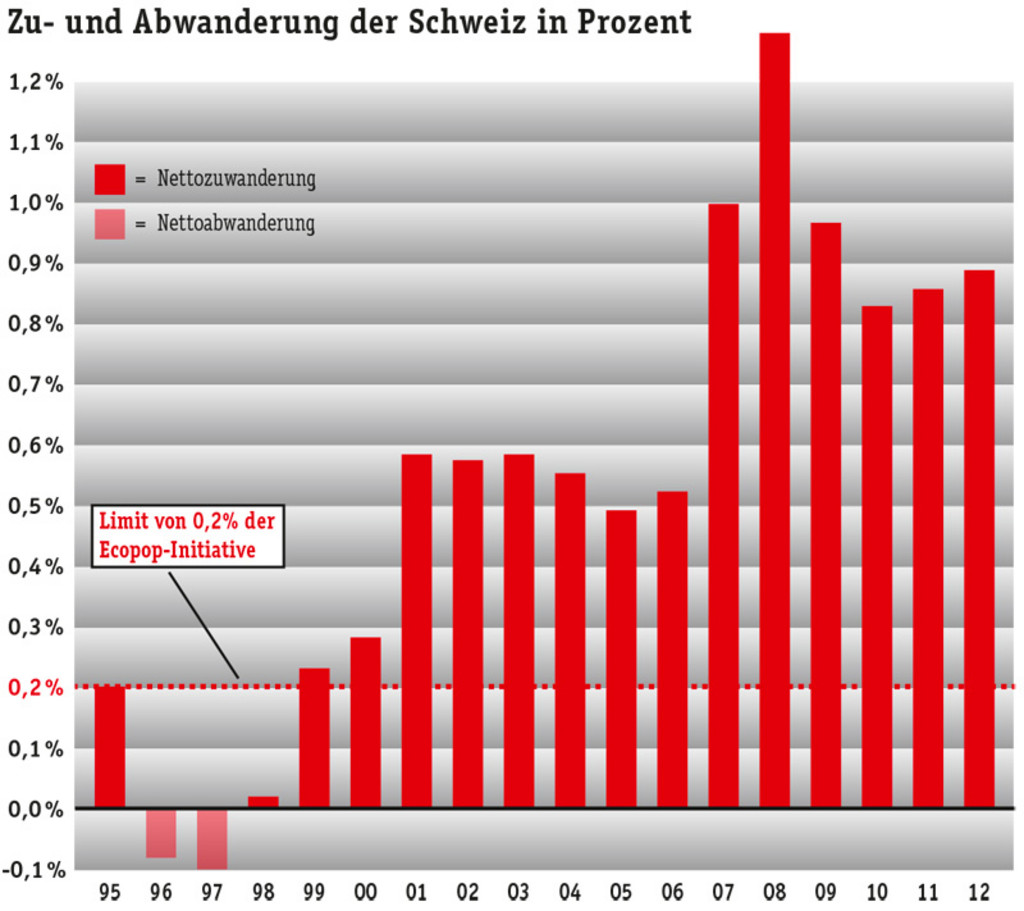“The bear cannot be washed without getting its fur wet.” Adrian Amstutz, the Swiss People’s Party (SVP) parliamentary group leader, quoted this old proverb in March 2014 during the National Council debate on the implementation of the initiative on mass immigration. With these words, Amstutz neatly summed up the current situation and indirectly conceded that Switzerland now faces enormous challenges in domestic politics and over policy on Europe since the adoption of the new constitutional provision on 9 February. At stake is nothing less than Switzerland’s relationship with the European Union as a whole, irrespective of the specific structure of Switzerland’s future immigration policy.
The minimum consensus over the bilateral approach that has existed to date between practically all political parties in Switzerland is crumbling. The bilateral approach has been regarded as the ideal solution for Swiss policy on Europe since the electorate rejected the European Economic Area (EEA) in 1992. Even the Swiss People’s Party (SVP), which has traditionally viewed any further integration of Switzerland into the EU with great scepticism, essentially supported this policy. It did not question the principle of the bilateral agreements even during the referendum campaign on the mass immigration initiative, and officially it has not changed its position. SVP General Secretary Martin Baltisser says: “We have to govern relations with the EU bilaterally, but it is the specific content of the agreements that matters.”
A pincer attack on the bilateral agreements
It is nevertheless obvious that the SVP no longer sees the bilateral approach as a top priority. Those on the right are seeking to seize the moment and steer the course of policy on Europe according to their own agenda. They are more than willing to accept further damage in relations with the EU. SVP parliamentary group leader Amstutz made this perfectly clear during the National Council debate in March: “If I could choose between the continuation of the excessive immigration which is destroying this country and the bilateral agreements, I would choose the protection of the nation, full stop.”
According to a Vox Analysis scientific study on the referendum, most of those who supported the SVP initiative were well aware that the adoption of the popular initiative might jeopardise the bilateral agreements. The Yes voters therefore attached greater importance to autonomous control of immigration than to good relations with the EU. This suggests that the bilateral approach, which was supported in all previous referenda, is no longer an undisputed issue among the Swiss people either.
The Campaign for an Independent and Neutral Switzerland (AUNS) group is lining up for a frontal attack. It is seeking to rescind the bilateral agreements and to simply govern relations with the EU by means of free trade agreements: “Both packages, ‘bilaterals 1’ and ‘bilaterals 2’, need to be replaced by an improved free trade agreement. We do not want any further bilateral agreements that are not in our nation’s interests. And we must terminate the detrimental elements of the bilateral agreements 1 and 2 – that is, the free movement of persons and Schengen/Dublin in particular – as they are ‘EU accession accelerants’ , or even ‘fire accelerants’ , and are damaging not just direct democracy but also our economy.” This is the message from AUNS President and SVP National Councillor Pirmin Schwander on his organisation’s homepage. Werner Gartenmann (SVP), the organisation’s executive director, confirmed that it was working on the launch of a popular initiative for a purely free trade agreement; the exact wording is currently being tweaked. Gartenmann firmly believes that 9 February marked the definitive start of a fundamental debate over the EU. This is also the view of the parties at the other end of the political spectrum, the Swiss Social Democratic Party (SP) and the Greens. Both are more committed than ever before to closer relations with the EU and no longer rule out the possibility of EU accession.
Centrifugal forces are becoming stronger
The Social Democrats wrote in their 2010 manifesto that they sought “the rapid introduction of accession negotiations with the EU”. But they never really pursued this objective forcefully, not least in light of the sceptical mood among the Swiss people. This is how SP parliamentary group leader Andy Tschümperlin expressed the position of the party leadership: the primary objective must be to implement the initiative on mass immigration without jeopardising the existing bilateral agreements and their further development. If this cannot be achieved, “the Swiss people must be given the opportunity to vote on the future of relations with Europe”. The SP is demanding that “all options on policy on Europe be examined”. Tschümperlin is calling for the Federal Council to outline “the possible consequences of EU accession and the continuation of bilateralism with or without a new institutional solution” in a comparative analysis.
The centrifugal forces within the governing parties have therefore become much stronger. The SVP is distancing itself from the EU more clearly than in the past and the SP is no longer ruling out EU accession, while most of the other parties are attempting to fly the tattered flag of bilateralism. This represents a highly uncomfortable starting position for the government. The new constitutional text obliges the Federal Council and Parliament to introduce a new admission system for all foreigners within three years, which will restrict immigration through maximum limits and quotas.
The question is how, if at all, this can be reconciled with the agreement with the EU on the free movement of persons. The Federal Council is planning to present an implementation concept by the end of June, and by the end of the year the proposals are to be formulated as articles of law which will then enter the consultation process. The art will lie in introducing quotas without at the same time infringing upon the principle of free movement of persons. Discussions with the European Union will take place in parallel to the domestic political process.
Now comes Ecopop
But it is not just the implementation of the initiative that is causing a headache for the politicians. The SVP has already threatened an enforcement initiative if the adopted popular initiative is not implemented in the way it believes it should be. And another initiative is already heading for the ballot box, the Ecopop initiative entitled “Stop overpopulation – safeguard our natural environment”. This is likely to be put to the vote as early as November 2014.
In specific terms, the initiative is calling for “the permanent resident population not to rise by more than 0.2 percent a year as a result of immigration on a three-year average”. That would currently equate to net immigration of just 16,000 people instead of around 80,000 today. The initiative clearly stipulates, in the transitional provisions, that international agreements which contradict these objectives will have to be either amended or terminated. In other words, the Ecopop initiative is much more radical than the adopted SVP initiative. It would lay down specific figures in the constitution and leave even less leeway for negotiations with the EU. The free movement of persons would no longer have even the slightest chance.
Ecopop, the term being a combination of ECOlogy and POPulation, is a prismatic organisation which appeals to a wide range of groups, including critics of growth as well as xenophobic factions. Ecopop perceives itself as a politically independent environmental organisation which focuses on population issues. Its homepage states: “Our goal is to preserve the natural environment and the quality of life in Switzerland and worldwide for future generations. Ecopop has been committed to opposing the overburdening of nature by an increasingly higher human population for over 40 years.” A clear political categorisation of the organisation is not possible. It was founded at the time of the excessive immigration initiatives put forward by James Schwarzenbach, but Ecopop rejected the initiatives of his National Action (NA) movement in the 1970s and 1980s. In the early days, NA President Valentin Oehen and Bernese SP city councillor and feminist Anne-Marie Rey were equally involved in Ecopop.
The modern organisation is very well aware that the direction of its agenda also appeals to groups which it would prefer to have nothing to do with. This is probably why the homepage stresses the following: “Ecopop distances itself from all misanthropic or xenophobic positions and wishes to contribute towards helping all people lead a dignified life irrespective of their nationality.”
Ecopop – “sinister ecologists”?
This clear-cut distancing from the political right does not quite work in practice. Ecopop was able to place an appeal for support for its initiative in the editorial section of Schweizerzeit, the mouthpiece of the former far-right SVP National Councillor Ulrich Schlüer. The initiative organisers were also able to count on the support of the right-leaning AUNS during the collection of signatures. This organisation distributed signature forms among its members. Ecopop also received official support with the collection of signatures from the Swiss Democrats (SD), a far-right party and the successor organisation to the NA. The party had launched its own initiative on excessive immigration in 2011. As the collection of signatures was not going well, the SD Executive Committee decided in summer 2012 to abandon its own popular initiative and to actively support the “more promising” Ecopop initiative.
The combination of nature conservation issues and immigration is not a new phenomenon. A reactionary ecological ideology has existed since as far back as the 1930s. Balthasar Glättli, a Green Party National Councillor in Zurich, is currently carrying out research for a book with the working title “Unheimliche Ökologen” (Sinister Ecologists) and has discovered “sinister roots”: links between conservationists, politicians preoccupied with population issues and eugenicists, the representatives of a science which believes that the population of people whose genetic make-up is desirable or deemed positive should increase while the rise in the population of people whose genetic make-up is categorised as negative is undesirable and should be prevented.
In this respect, the passage in the Ecopop initiative about birth control in the Third World is particularly contentious. In a second development policy section, the initiative calls for Switzerland to use 10% of development cooperation funds on “measures aimed at promoting voluntary family planning”. Urs Schwaller, a Council of States member for the Christian Democratic People’s Party (CVP), calls this a “colonial view of family planning in developing countries”. Development policy organisations have also voiced severe criticism of this demand. They believe that Ecopop is ignoring the structural causes of population growth. It is generally recognised today that high birth rates are primarily related to poverty. An abundance of children is seen as a means of guaranteeing survival. Therefore, in order to reduce family size and population growth, the primary focus must be on promoting the education of women and girls. In an interview with the “Neue Zürcher Zeitung”, Shalini Randeria, a professor of anthropology and developmental sociology in Geneva, clearly outlines the attitude that leads to demands such as those made by Ecopop: “It is always other people who are surplus: the poor, the foreigners. (…) It is never just a question of figures but always a matter of who is allowed to reproduce and who is not.” The issue of population is inseparable from that of resource consumption, points out the professor, as “the inhabitants of New York City consume more energy in one day than the entire continent of Africa”.
Immigration and conservation were also an issue in the 1979 Schwarzenbach initiative. Even back then there was condemnation of Switzerland’s urban development. The SVP, which has made immigration its priority issue, initially based its arguments on abuse of the social security system and criminality, but then discovered ecology during the final push in the referendum campaign and displayed images of urban sprawl on its posters.
Challenge for the Greens and for the SVP
There are major challenges facing the Greens, in particular, whose leadership is firmly opposed to the Ecopop initiative and is seeking to play a key role in the referendum campaign. Regula Rytz, Co-President of the Greens, constantly reiterates that the party has no problem with the number of people but rather a per-capita problem. The key factor is the ecological footprint not the number of people. However, the view of the Green Party’s grass roots is not yet clear. Representatives of the Greens are also actively involved in Ecopop: Andreas Thommen, former party leader in Aargau, is a member of both the executive committee and the initiative committee.The position of the political parties is clear. Only the SVP is still tight-lipped, while all the others are opposed to the initiative. In the Council of States, which rejected the proposal in March, the SVP abstained from voting. There are problematic aspects to the initiative, says SVP General Secretary Martin Baltisser, “after all, it does come from the left and green factions as well”. He was nevertheless unable to foresee what view the party base will take when it comes to drawing up the position statement. The party is clearly faced with a dilemma: The initiative is far too radical for business groups but it may well receive support from the party’s grass roots, like any calls to restrict immigration.
Jürg Müller is an editor with the “Swiss Review”
A spanner in the works of the political system
In no other state do citizens have more co-determination rights than in Switzerland. Direct democracy is a successful model. The change in the purpose and importance of popular initiatives nevertheless shows that Switzerland’s political system is working less effectively than in the past. Popular initiatives are a “growth market” in politics, and business is very brisk at the moment. The figures speak for themselves: 423 initiatives have been launched since the introduction of the popular initiative system in 1891. Signatures are currently being collected for 9 initiatives, and 20 are either being considered by the Federal Council and Parliament or are waiting to be put to the vote at referendum. 189 bills have made it to the referendum stage since 1891, but only 21 have been adopted by the people. And here are the most interesting figures: Only 9 initiatives secured a majority of Yes votes in the first 100 years between 1891 and 1990, whereas 13 have been approved since 1990. Popular initiatives have therefore had a significantly better chance of being supported by the people over the past 25 years than before that time. There is no clear, undisputed explanation for this. Silja Häusermann, a professor of political science at the University of Zurich, points out that until the early 1990s popular initiatives were mainly an instrument of the left used to take a position as a minority against the then practically closed conservative alliance. This tool was usually not enough to secure majority support but it was a means of introducing new ideas into politics. Even unsuccessful initiatives triggered debates in many cases and sometimes also reform processes that achieved their objective after several attempts. Initiatives are today no longer just used by the left and Greens but also by conservative and right-wing parties and institutions – in particular by the Swiss People’s Party (SVP) and the organisations associated with it. Initiatives are also often clearly used as a marketing instrument for election campaigns and as a vehicle to generate public outrage or to assert vested interests.
A paradox of the system
Popular initiatives are also often difficult to implement, especially when they are incompatible with other constitutional principles or international law. This then causes indignation among the initiators: The SVP, in particular, exerts pressure using enforcement initiatives – it is also threatening to use this tool in the case of the “initiative on mass immigration”. The insistence on literal implementation destroys the proven political culture of equilibrium and compromise of which Switzerland is so proud. “It is a kind of paradox,” explains Silja Häusermann: “The increasingly frequent use of the instruments of direct democracy is an indication that Switzerland’s political system is working less effectively.” Swiss democracy is after all geared towards consensus. The rights of the people were initially intended to have a “preventative effect”: The political players were to reach viable compromises so that referenda and initiatives did not have to be deployed. There is now a “spanner in the works” of this fragile mechanism, says Häusermann. She sees this as the “consequence of polarisation and the much more intense competition between the political parties”. �















Comments